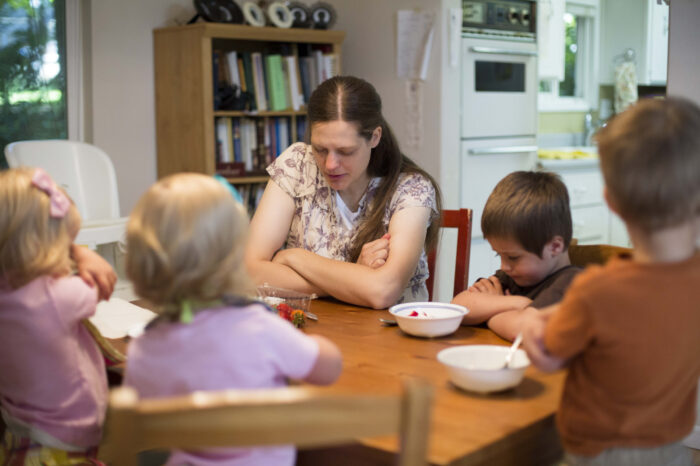
Parents are hands down the most significant influence in the spiritual lives of their children. You have powerful formative effects on your kids in every way, including shaping and passing down a faith that lasts.
Moms and dads are the primary link between young people and God. Not the church.
In the last 50 years, the main hub of activity around faith has shifted from the congregation or community to the household.
The church certainly plays an important role in your kids’ faith. But pastors and youth leaders exist to equip you and supplement the work you are doing in the home; they don’t exist to replace you.
The primary responsibility for building faith in your children belongs to you.
However, the good news is that God would never give you a task and not equip you for it. Your kids don’t need the best communicator or the most knowledgeable person in order to build their faith.
They just need you- a parent that loves them and who’s invested in their spiritual growth.
It’s never too early to set the trajectory of solid Christian faith for your children!

1. Have Them Hear It
Romans 10:17 says, “Faith comes from hearing, that is, hearing the Good News about Christ.” In this age of constant information, it’s important that our kids hear the Gospel often and through different sources of media.
Make it a regular, integral part of your daily routine. Read the Bible out loud while your children are eating a meal, and before naps or bedtime. Listen to the Bible app with them.
When you’re going for walks or playing outside, point out things in nature and say something like “It’s so amazing that God made this (creature/creation) to (fill in the blank).”
Besides attending church, play online sermons during the week, or podcasts that exposit the Word of God. Listen to memory verse songs and Christian music. Get a CD of children’s worship songs and sing along with it.
It’s crucial that our kids not only hear the Gospel, but also hear us talk about its power in our own lives. They should hear us rejoicing in our Savior and thanking God for His many blessings.
Testimonies are especially powerful. Share stories from your personal walk with the Lord and how God has faithfully answered your prayers in the past.
When appropriate, share about different circumstances and trials you are currently going through, and how you’re relying on God for strength, wisdom, etc. Then, remember to share how He works through that particular situation.
It’s important for our children to see that God is real and active, and a very present help in times of trouble!

2. Disciple Them In It
As much as our kids need to understand the source of salvation, they also need to know a God who cares about their present struggles. If all we talk about is “being saved”, it communicates that faith is a destination, rather than a journey.
And worst of all, it could give our children the impression that the Bible is just an antiquated book that doesn’t inform their current situation.
Start by helping them see their struggles as God’s concern. Draw out encouragement and exhortation from Scripture that relate to specific behaviors, circumstances, disappointments, etc. Pray with them about their anxiety over school assignments, and hurt from losing a friendship.
As you do this, the Gospel will come to life. Because the Good News of Jesus Christ doesn’t just inform salvation. It informs everything. Addictions. Temptations. Identity issues.
And once your children see that God walks with them through their struggles, they will have a stronger desire to give their lives to Him.

3. Explore It With Them
Having questions isn’t bad. But not getting the right answers to those questions can be catastrophic.
In today’s culture, both good and bad information is available on-demand. And as our kids battle with difficult questions about sexuality and social issues (among many other things), the world is forming their perspective. Every article. Every meme. Every video.
It is more important than ever that parents discuss difficult topics with their children, depending on their age and maturity.
Sure, these conversations are awkward and they create tension. But these are the questions that are prevalent in the lives of your children.
And unless you create space for the hard questions, they will turn to other sources for answers. Whoever talks to a child first about something becomes the authority on that subject.
Most likely, your kids have doubts. You need to be willing to sit down with them and search out solid answers to these concerns. Also, don’t be afraid to share that you’ve had doubts from time to time as well.
Otherwise, when questions about Christianity come, your children will believe others have thought more deeply about the faith than you have. And they’ll become your kids’ authority on the topic.

4. Give Them Opportunities To Practice It
It doesn’t take much these days to notice that our world is broken. In fact, it seems more sinful than ever. And it can make us want to completely hide our children away.
Paul instructs the Ephesians how to respond in the midst of a culture blanketed with sin. He tells them to put on the full armor of God (Eph. 6:10-20). In other words, jump in the fight. Paul expected the Christians in Ephesus to engage the culture, not run from it.
By all means, give your kids an education from a biblical worldview, but don’t totally shelter them from the harsh realities of this world.
When the ultimate goal is making sure our children never experience the evils of our culture, we not only do them an injustice, we rob them of seeing the Gospel’s transformative power.
As a parent, your objective should be to teach your kids how to engage the culture for the glory of God. They should neither be surprised by nor afraid of society’s acts, narratives, or their hatred of Christianity.
5. Live It Out
Kids can be told all about the glory of the Gospel daily and hear it at church every Sunday, but when they actually see it demonstrated by those who love them most, it is powerful. If they observe your faith in action, it leads them to have their own individual convictions.
Love the hard to love people. Model forgiveness and repentance. Show that you trust God with your resources, future, and money. Children need to see you trusting in the promises of Scripture.
They need to see you making decisions as though God is real and alive, not a set of rules or a list of “do’s and don’ts.” If you boil Christian living down to church attendance and morality, your children will notice.
Acknowledge your faults and failures, and how you’re turning to the Lord for help. There is power in vulnerability and authenticity with your kids. They should understand that the path to intimacy with God involves seasons of hardship and struggles.
Above all, work at your relationships with your kids. If you’re going to impress God’s commands on your children’s hearts as you “sit in your house and walk by the way and when you lie down and when you rise up”, a warm, close relationship simply isn’t optional.
You need to have their hearts if they’re going to learn anything from you about faith. They will experience Christ best when they feel His love through you!

You are painting a portrait of God for your children every day. Every word, action, and conversation is a brushstroke.
And when your children prepare to leave home, they will be staring at this portrait which shapes their actions and decisions about faith moving forward.
Are there exceptions? Absolutely. Young people leave Jesus, even though the faith of their parents are rock solid. They continue into college on fire for God, even though their parents have shaky, fickle faith.
But will you, in your Christian parenting, play an enormous role in shaping the faith of your children? No doubt.

Leave a Reply
You must be logged in to post a comment.